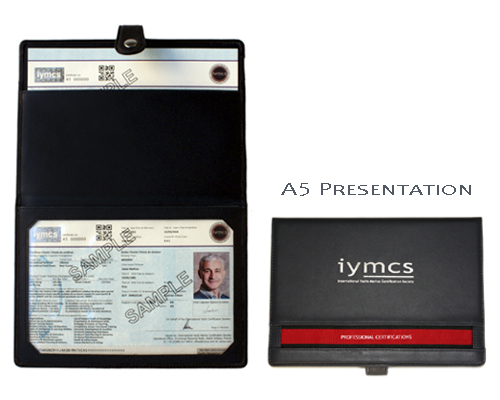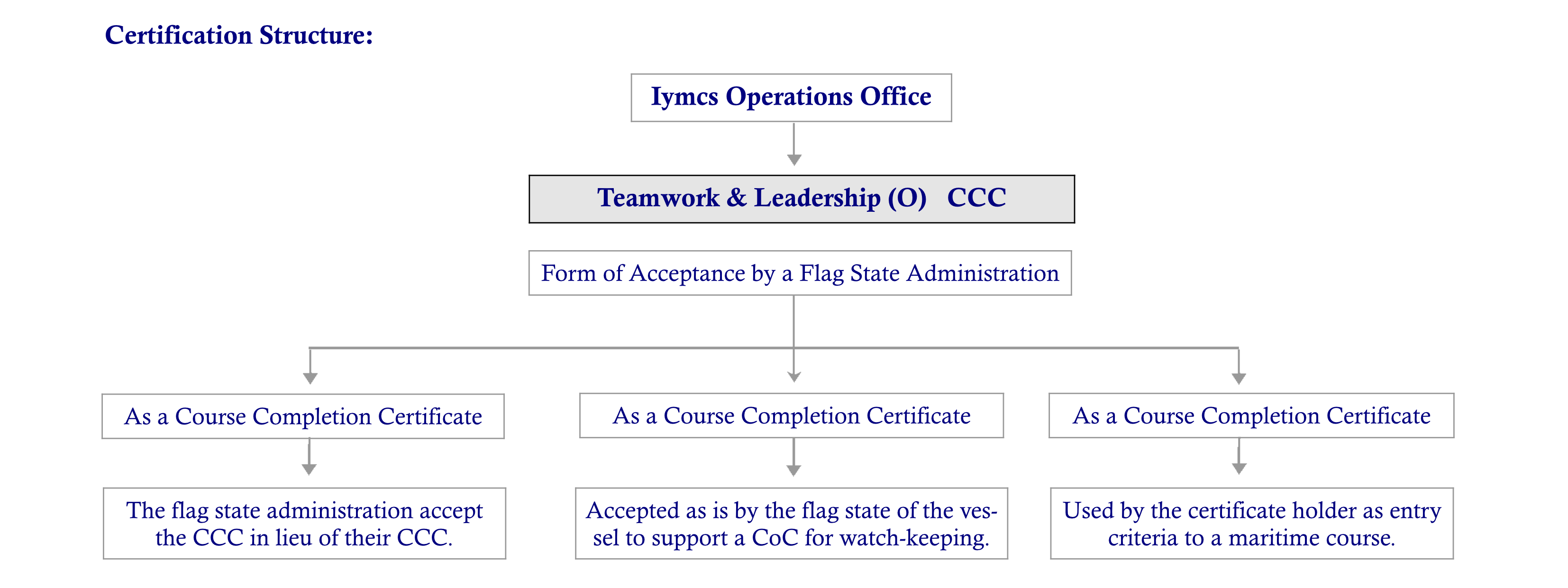
| General Details |
|---|
| Course & Certification:
ID: 6.4.9 Description: Teamwork & Leadership (O) Certification type: Course Completion Certificate ISO 9001:2015 compliance course & certification. |
| Course Length:
A total of 24 hours consisting of: Pre-Course study = 1 hours; |
| Capacity of certification:
For Master of vessels less than 500GT, Officer of the Watch of vessels less than 1600GT, carrying no more than 30 passengers. Exclusions: Cargo handling and stowage. |
| STCW 1978/2010 amend.:
This certificate is issued in accordance with the Regulations A-II/1 and A-II/3 in part concerning Deck Navigation Officers and, Regulation A-III/1 in part concerning Engineering Officers, of the STCW Convention 1978 as amended 2010. |
| Reference Standards:
IMO Model Course ref: 1.39 |
| Examining body:
Global Institute for Maritime Education and Training, 900682 Constanta, Romania. |
| Certification Revalidation:
Required every 5 years with the undertaking of a refresher course. |
| Sea-time requirements:
90 days Onboard Service and 30 days actual sea-time. |
| Certification issuing requirements:
Seafarers Medical Certificate |

The custom-designed Iymcs presentation folder type certification is stylish and practical.
The presentation folder outer is made of real leather with a sythentic interior that is resistant to water and protects the certificates.
It is A5 in size, it can hold up to four Certificates, and is an ideal size to be kept in a crew document case or with the boat's documents.
The Iymcs Certificates are printed to ISO 9001:2015 standards, are dual-language and feature extensive security features
to security level 3 (Government passports & national Iidentification documents are security levels 1 & 2) and can be used as a personal ID in daily situations.
(Nb. It cannot be used instead of a passport/national identity card).
The Iymcs Teamwork & Leadership (O) course is the IMO model course ref. 1.39, for Master of vessels less than 500GT, Officer of the Watch of vessels less than 1600GT, carrying no more than 30 passengers. Excluded is cargo handling and stowage.
On-board a large yacht (super-yacht) or commercial work boat, it is the Bo’swains or junior Mates on deck, the junior Engineer Mates, the Chief Steward/ess or Purser, that are managing tasks. With their small teams of crew members, they have to organise, motivate the crew to undertake tasks throughout a day’s work.
They need to have good communication skills, understand the limitations of the crew in their charge, as well as motivating them, and be a good self-organiser. The implementation of health and safety measures are an essential part of their work. Captains of large yachts and commercial work-boats of under 30 metres, often have just 3-4 crew who are multi-tasking in different roles. The Captain has to adopt a more direct approach to management as there is no-one to delegate to.
A continous assessment is made during the course by undertaking case scenarios with open discussions on how best to deal with each one. Additionally, there is a written Teamwork & Leadership Exam to undertake and pass to qualify.
Certification Structure:
The certification issued is an Iymcs Course Completion Certificate (CCC), it needs to be presented to the Flag Administration of the vessel you intend
to work-on, or are working on, for their independent assessment, acceptance on a case-by-case basis.


Our Society, the 'International Yacht Marine Certification Society" (Iymcs) operates its entire operations under a Quality Management System
(QMS) that is in compliance with the International Standards Organisation (ISO) 9001:2015 amended. Part of this compliance involves full auditing procedures.
This is an important reference and enables us to gain recognitions from maritime administrations and marine industry bodies alike.
The QMS together with the ISO, ensures that Iymcs and its Members operate to the highest standards possible. All our courses, and more importantly the
Certifications that we issue, are under ISO 9001:2015.
This practice is most unusual to see for such courses and certifications. It ensures a uniform and consistent quality standard throughout the Society's operations.
| Scandinavia 370,-EUR | Northern Europe 350,-EUR | United Kingdom 290,-GBP |
| Southern Europe 345,-EUR | Middle East 370,-USD | North America 390,-USD |
| Prices exclude: course books,certification costs,personal traveling costs,course food and course accommodation. | ||
( IMO model course 1.39 Vers. 1.2 ) Click-on '+' to see Syllabus
3.1 Organization of crew, authority structure, responsibilities. 4.1 International Maritime Conventions: SOLAS, MARPOL, STCW, MLC, role of IMO, ILO. 4.2 Recommendations & national legislation.
3.2 Cultural awareness , inherent traits, attitudes, behaviour, cross-cultural communication. 3.3 Shipboard situation, informal social structures on board. 3.4 Human error, situation awareness, automation awareness, complacency, boredom. 3.5 Leadership & team-working. 3.6 Training, structured shipboard training programme. 3.7 Knowledge of personal abilities & behavioural characteristics.
4.1 Planning and coordination. 4.2 Personnel assignment. 4.3 Human limitations. 4.4 Personal abilities. 4.5 Time & resource constraints. 4.6 Prioritization. 4.7 Workloads, rest & fatigue. 4.8 Management (leadership) styles. 4.9 Challenges & responses.
5.1 Effective communication on-board & ashore. 5.2 Allocation, assignment & prioritization of resources. 5.3 Decision making reflecting team experience. 5.4 Assertiveness and leadership, including motivation. 5.5 Obtaining & maintaining situational awareness. 5.6 Appraisal of work performance. 5.7 Short & long term strategies.
6.1 Situation & risk assessment. 6.2 Identify & consider generated options. 6.3 Selecting course of action. 6.4 Evaluation of outcome effectiveness. 6.5 Decision making & problem solving techniques. 6.6 Authority & assertiveness. 6.7 Judgement. 6.8. Emergencies & crown management.
Case scenario 1:
Application of Maslow’s hierachy in practice.
Case scenario 2:
Applying elements to work attitudes in practice
Case scenario 3:
Recognising human limitations when undertaking tasks
Case scenario 4:
Rational decision making in practice
Case scenario 5:
Applying different management styles in practice
Case scenario 6:
Assessing situational awareness in practice
Case scenario 7:
Conducting an annual performance assessment of a crew member